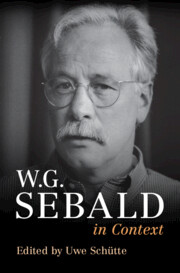Book contents
- W.G. Sebald in Context
- W.G. Sebald in Context
- Copyright page
- Dedication
- Contents
- Illustrations
- Notes on Contributors
- Preface
- Acknowledgements
- Note on Text
- Chronology
- Abbreviations
- Works by W.G. Sebald
- Part I Biographical Aspects
- Part II The Literary Works
- Chapter 8 Unpublished Juvenilia
- Chapter 9 Film Scripts
- Chapter 10 The Prose Project
- Chapter 11 Auto-/Biography
- Chapter 12 Natural History and the Anthropocene
- Chapter 13 The Corsica Project
- Chapter 14 Poetry
- Chapter 15 The World War Project
- Chapter 16 Interviews
- Part III Themes and Influences
- Part IV Reception and Legacy
- Further Reading
- Index
Chapter 9 - Film Scripts
from Part II - The Literary Works
Published online by Cambridge University Press: 24 August 2023
- W.G. Sebald in Context
- W.G. Sebald in Context
- Copyright page
- Dedication
- Contents
- Illustrations
- Notes on Contributors
- Preface
- Acknowledgements
- Note on Text
- Chronology
- Abbreviations
- Works by W.G. Sebald
- Part I Biographical Aspects
- Part II The Literary Works
- Chapter 8 Unpublished Juvenilia
- Chapter 9 Film Scripts
- Chapter 10 The Prose Project
- Chapter 11 Auto-/Biography
- Chapter 12 Natural History and the Anthropocene
- Chapter 13 The Corsica Project
- Chapter 14 Poetry
- Chapter 15 The World War Project
- Chapter 16 Interviews
- Part III Themes and Influences
- Part IV Reception and Legacy
- Further Reading
- Index
Summary
A decade before becoming famous for his prose narratives, W.G. Sebald worked on two film projects that remained unrealized in his lifetime and have not yet been extensively studied. These intended films were to focus on the lives of two philosophers, Immanuel Kant and Ludwig Wittgenstein, but Sebald only tangentially engages with their philosophical work. Instead, the film scripts consist of biographical sketches and, in the case of the Wittgenstein project, images. A closer look at these two projects reveals Sebald in a transitional phase in his development from academic to literary author. The works bear similarities to the style and themes for which he later became known: intertextuality, the pitfalls of human progress, and death. The Wittgenstein project also marks a starting point for Sebald’s interest in characters who bear a resemblance to the philosopher, which would persist throughout his literary career.
- Type
- Chapter
- Information
- W. G. Sebald in Context , pp. 76 - 84Publisher: Cambridge University PressPrint publication year: 2023

